Park Life

Is the sea real?
LGBTQ issues - still a question?
Which teacher shares your personality type?
Opinions, quizzes, crosswords and more!


Is the sea real?
LGBTQ issues - still a question?
Which teacher shares your personality type?
Opinions, quizzes, crosswords and more!
Dear Readers,
This year we make no apology for the lack of a theme. We came into this project with a very clear goal in mind: to create a magazine that reflects our current student body. Something that allows for all voices to be heard and invites everyone to get involved. No easy feat. We wanted to shed the idea that the student magazine is only for 'serious writers' and instead invite everyone and anyone to take part. As a result our student team has expanded (hurray!) and the diverse range of writing we received reflects the wide range of interests amongst this group. This year's issue is a mix of student voices, varied in tone and concerns, all unapologetically themselves.
The more eagle-eyed amongst you may have identified the image of the Palladian bridge on our cover, a somewhat iconic emblem of our school. Whilst the Andy Warhol print has become something of a visual cliché at this point, we believe that its power lies in the ability to simultaneously reference our past and our present. The stunning buildings which we are lucky enough to walk through every day are a reminder of our history and our past, but we, the students, fill them with noise, colour, life. The reality is that the student body at Prior is an incredible blend of people from different cultures, with different interests, hobbies and viewpoints and their publication should reflect just that. This is an issue for the students, by the students.
Victoria CorfieldCover art designed by Sienna Tan
Artwork collated by Evie Rayner-Bentman
Editorial team: Victoria Corfield and Thomas Roblin
Special thanks to Dr K McGowran
1-2 Out of their minds
3-4 The 'Mind-Forged Manacles'
5-8 16 personalities Quiz
9-10 All Roads Lead to Bath
11-12 The Silk Road
13-14 Drawing the Iron Curtain
15-16 MY Body, MY Choice
17-18 The sea is not real.
19 In Spite
20 Never Have I Ever... PPC Edition
21-22 Protest is not a crime.
23-24 The write to offend
25-26 Eco-Prior
27-28 The LGBTQuestion?
29-30 Pride Flag Quiz
31-32 Fracking Hell
33-34 The Nuclear Option
35-36 Going for Broke
37-38 Park Life Crossword


'I saw the best minds of my generation destroyed by madness, starving hysterical naked' Allen Ginsberg, Howl (1955)
'I saw the best minds of my generation destroyed by madness, starving hysterical naked' Allen Ginsberg, Howl (1955)
Today mental health is one of the most serious problems that affects (directly or indirectly) many people in the world, especially the younger generation. Such a widespread presence of mental health problems was also a serious issue in the decades following the Second World War. Attitudes have changed towards people struggling with their mental health. It is less stigmatised, more able to be expressed and therefore shared. But something that hasn't changed as much as we might have thought, are the voices of those dealing with issues such as depression, anxiety and many more. Often these were young people, often these were creative people, and they developed a space in poetry and in the novel and film, which made it possible to explore such issues.
Today mental health is one of the most serious problems that affects (directly or indirectly) many people in the world, especially the younger generation. Such a widespread presence of mental health problems was also a serious issue in the decades following the Second World War. Attitudes have changed towards people struggling with their mental health. It is less stigmatised, more able to be expressed and therefore shared. But something that hasn't changed as much as we might have thought, are the voices of those dealing with issues such as depression, anxiety and many more. Often these were young people, often these were creative people, and they developed a space in poetry and in the novel and film, which made it possible to explore such issues.
During the period of time after the war between 1950-1960, books and poetry by Sylvia Plath, Ken Kesey, Richard Yates, Robert Lowell and Sloan Wilson spoke out about mental health problems and, in the case of Sylvia Plath and Lowell especially, wrote in a new genre, the confessional mode. The Bell Jar is one of the most famous and celebrated novels, it is a thinly-disguised account of Plath's struggles with depression and suicidal thoughts. It details how she was treated by a medical profession with a dismissive attitude towards mental illness and, in particular, to women suffering with mental health issues. Dr Gordon is the first doctor that is brought in to help Esther and his dismissive attitude toward her problems result in his prescription of ECT: this round of ECT is not helpful and leaves her, 'wondering what terrible thing it was that I had done'. However following her negative experience of this she changes doctor to Dr Nolan, who again suggests ECT as a form of therapy, yet her attitude is understanding and compassionate (hugely contrasting with the patronising Dr Gordon), 'I'll be there the whole time...I'll be there when you wake up and I'll bring you back again'. This changed approach to ECT leaves her 'at peace,' and with the metaphorical bell jar, 'hung, a few feet above my head... Open to the circulating air'. Esther's voice in the novel is the opposite of the 'Sivvy' of Plath's letters home, telling the story of a high achieving successful and happy student. The Bell Jar is the story of what she couldn't fully share with her mother, feelings of depression and failure; her experience of the cognitive dissonance felt by many women in the '50s who were educated to the same level as their male peers but were then expected to become 'homemakers'. I had heard a lot about The Bell Jar before I read it, through speaking to people, seeing editions in book shops and hearing about Sylvia Plath and her connections to other poets I study in English, like Ted Hughes. The book is very powerful for me and many others because, although it is now nearly 60 years old, many of the issues and themes in the explored book are still relevant today for young people.
During the period of time after the war between 1950-1960, books and poetry by Sylvia Plath, Ken Kesey, Richard Yates, Robert Lowell and Sloan Wilson spoke out about mental health problems and, in the case of Sylvia Plath and Lowell especially, wrote in a new genre, the confessional mode. The Bell Jar is one of the most famous and celebrated novels, it is a thinly-disguised account of Plath's struggles with depression and suicidal thoughts. It details how she was treated by a medical profession with a dismissive attitude towards mental illness and, in particular, to women suffering with mental health issues. Dr Gordon is the first doctor that is brought in to help Esther and his dismissive attitude toward her problems result in his prescription of ECT: this round of ECT is not helpful and leaves her, 'wondering what terrible thing it was that I had done'. However following her negative experience of this she changes doctor to Dr Nolan, who again suggests ECT as a form of therapy, yet her attitude is understanding and compassionate (hugely contrasting with the patronising Dr Gordon), 'I'll be there the whole time...I'll be there when you wake up and I'll bring you back again'. This changed approach to ECT leaves her 'at peace,' and with the metaphorical bell jar, 'hung, a few feet above my head... Open to the circulating air'. Esther's voice in the novel is the opposite of the 'Sivvy' of Plath's letters home, telling the story of a high achieving successful and happy student. The Bell Jar is the story of what she couldn't fully share with her mother, feelings of depression and failure; her experience of the cognitive dissonance felt by many women in the '50s who were educated to the same level as their male peers but were then expected to become 'homemakers'. I had heard a lot about The Bell Jar before I read it, through speaking to people, seeing editions in book shops and hearing about Sylvia Plath and her connections to other poets I study in English, like Ted Hughes. The book is very powerful for me and many others because, although it is now nearly 60 years old, many of the issues and themes in the explored book are still relevant today for young people.
Plath was a young, intelligent and hugely creative figure, who intermittently struggled with her mental health until she killed herself at the age of 30. Ian Curtis, who was also extremely clever and creative, and who died very young, is someone else whose talent was overshadowed by mental health issues. I found out about Joy Division through discovering old vinyls. The confessional mode is used in 'Disorder' by Joy Division, 'I've been waiting for a guide to come and take me by the hand, Could these sensations make me feel the pleasures of a normal man? I've got the spirit, lose the feeling.'
Plath was a young, intelligent and hugely creative figure, who intermittently struggled with her mental health until she killed herself at the age of 30. Ian Curtis, who was also extremely clever and creative, and who died very young, is someone else whose talent was overshadowed by mental health issues. I found out about Joy Division through discovering old vinyls. The confessional mode is used in 'Disorder' by Joy Division, 'I've been waiting for a guide to come and take me by the hand, Could these sensations make me feel the pleasures of a normal man? I've got the spirit, lose the feeling.'

These lyrics describe Curtis's desire for acceptance in his life; Curtis was diagnosed with epilepsy in 1978 and felt isolated because of his condition. Following his diagnosis he became depressed, committing suicide in 18th May 1980 aged 23. For him, his lyrics were a way of expressing his feelings in a world where he didn't feel comfortable saying them outright, and it resonated with many people at the time as well as now too. The confessional mode in music and the novel allows a more personal form of expression, an outlet to voice what seemed like unspeakable thoughts. It seems to have been the only way for some of these figures, like Plath or Curtis, to express their true feelings. It seems positive now when we look back at these works, that it is easier for the majority of people to show how they are really feeling, and in a number of different ways. Mental health is still a very private and sensitive issue for many people but overall as a society there is a much wider acceptance for those people suffering with problems contrasting with the post war period where the huge number of people dealing with problems with their mental health didn't feel as though they could share these problems with people even as close to them as their parents.
Referenced to as "one of the most famous studies in the history of psychology", the Stanford Prison Experiment aimed to investigate the behaviour of individuals when assigned unfamiliar social roles. Conducted by Dr Phillip Zimbardo, the shocking results raised the question as to how it can be applied to our daily lives - how far are we collectively prepared to act when belittled to feel stripped of our individual identity?
The famous (and ethically questionable) study of 1971 set up a mock prison in the basement of Stanford University's psychology department, California. Taking the role of 'Prison Superintendent', Zimbardo screened a group of male student volunteers, taking on the 24 'most stable' to randomly assign them either the role of a prisoner or guard. The prisoners were then unexpectedly arrested at home and on entry to the 'prison', given an identity number and treated as if they'd committed serious crimes. This was planned to last two 2 weeks.
However, the plan soon deteriorated. The volunteers that were assigned the role of ‘guards’ displayed callous and tyrannical behaviour towards the prisoners, making them carry out degrading activities. Some participants appeared to forget that it was a psychological study, conforming to their role when they weren't being watched. "While I was doing it, I didn't feel any regret" said a mock guard two months later, openly talking of the prison guards' sadistic demeanour in a post-experimental interview. "I had really thought that I was incapable of this kind of behaviour." When one prisoner had had enough, he asked for a parole instead of requesting to be withdrawn from the study - it clearly wasn't just the guards that conformed to their social roles. Despite the invariable bearing of demand characteristics (specifically argued in Banuazizi and Movahedi's analysis of the experiment in 1975), it’s evident that the prisoners internalised their role. Five had to be released early due to their extreme reactions, suggesting not only the inhumane disposition of the guards, but also that they felt degraded, almost as if they didn't have the voice to speak up and ask for the radical treatment to change.
Many other studies on conformity such as Jenness' Estimation experiment (1932) and Asch's Line Judgement task (1951) propound how easy it is to 'go along with the crowd' and yield to social pressure, however, none expose the dangers of it like Zimbardo. His work visibly highlighted how totalitarian

regimes can gain influence on an impressionable crowd, and this is more than pertinent when reflecting on the history of Nazi Germany. In April 1967, Californian school teacher Ron Jones struggled to explain the extent of Hitler's cruel dictatorship throughout the zenith of the Third Reich to his Contemporary World History class. He devised a plan to carry out something that would evince it more 'realistically', aiming to elucidate how the German population could have accepted the Nazi regime. Constructed at Cubberley High School in Palo Alto, the "Third Wave" served as a demonstration of the appeal to fascism but, as like Zimbardo's, the experiment soon spiralled out of control - the movement began to emanate from the classroom space and spread throughout the school. Initially, he had created a society intending to mimic a fascist rule, deceptively introducing the Third Wave's apparent objectives early on, telling his students that the movement aimed to eliminate democracy. However, his motto remained ambiguous with the words "Strength Through Discipline, Strength Through Community, Strength Through Action, Strength Through Pride" (which was written on the classroom's chalkboard and soon carried in corridor conversation). Similarly, Orwell's Nineteen Eighty-Four (1949) uses the slogan "War is Peace/Freedom is Slavery/Ignorance is Strength" - both Jones' experiment and this novel are of a didactic nature, wanting to draw attention towards the dangers of a totalitarian society. Interestingly, they both use equivocal sayings with urgency on individual "strength", yet clearly many of Jones' participants and Oceania's 'comrades' were never told how their strength was supposed to be used, and there was vagueness around why they were supposed to be using it. The Third Wave began with simple procedures such as standing up to ask questions, talks on the importance of discipline and sitting at attention, but the students' strict adherence to these tasks made Jones want to take the experiment further. Used to deliberately imitate elements of the Nazi regime, particularly the Hitler Youth (also shown through the ‘Youth League’ in Nineteen Eighty-Four), he included a salute, creation of propaganda and issued individual member cards. The students were even encouraged to ‘recruit’ new members. By the fourth day, the movement had over 200 participants.
Jones' work drew to a close when on the fifth (and last) day, the students responded with zeal when asked to shout chants of "Strength through Discipline! Strength through Community!" etc. This was when he found it growing out of his hands - the attempt to educate them from a different angle had gone too far. Jones announced that they had, without knowing, demonstrated how easy it is for charisma to lift a corrupt leader into power, and how quickly a simple motive and broad slogan can carry one into success. Curiously, both the behaviour of Zimbardo's participants and Jones' students indicated key elements of an autocratic society, showing subservience to the made-up 'state' and willingness to complete dubious tasks. They both bespeak the reliance that unrighteous leaders have on conformity, suggesting that once an individual loses their identity, its easier for them to become a tool of the state. The dictatorial environment drove both groups to do things that they arguably wouldn't attempt under real-life conditions, suggesting that an absence of one's ‘sense of self’ is the leading factor in totalitarian success.
BY AMY EMBERSON L6The 16 personalities quiz is a free online personality test comprised of multiple choice questions where each letter reveals a different aspect of your personality

Scan this QR code to take the test!
What do each of the letters mean?
Mind: how we interact with our environmentExtraverted (E) or Introverted (I)
Energy: where we direct our mental energyIntuitive (N) or Observant (S)
Nature: how we make decisions - Thinking (T) or Feeling (F)
Tactics: reflects our approach to work - Judging (J)or Prospecting (P)
Architect
Imaginative and strategic thinkers, who always have a plan
Famous INTJs
Michelle Obama
Elon Musk
Friedrich Nietzsche
Arnold Schwarzenegger
Fictional INTJs
Severus Snape
Dr Frankenstein
Batman
Wednesday Addams
1. 2. 3. 4.which one are you? which one are you?
Consul
Incredibly empathetic, social and popular people who are always willing to help
Famous ESFJs
Taylor Swift
Bill Clinton
Steve Harvey
Jennifer Lopez
Tyra Banks
Fictional ESFJs
Daphne
Bridgerton
Monica Geller
Cedric Diggory
Troy Bolton
Emily Cooper
Cher Horowitz
Tranquil and mystical, yet incredibly inspiring and relentless idealists
Famous INFJs Fictional INFJs
Mother Teresa
Lady Gaga
Marie Kondo
Nelson Mandela
Martin Luther
King
Jay Gatsby
Elsa (Frozen)
Edward Cullen
Obi-Wan Kenobi
Albus
Dumbledore
Lisa Simpson
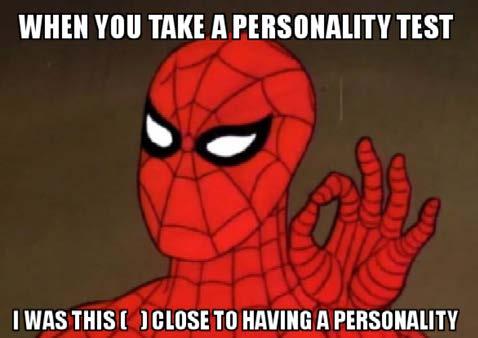
Debater
Clever and curious thinkers who will never back down from an intellectual challenge
Famous ENTPs
Mark Twain
Tom Hanks
Thomas Edison
Celine Dion
Sacha Baron Cohen
Fictional ENTPs
Captain Jack
Sparrow The Joker
Fleabag Dustin (Stranger Things)
Chandler Bing
Poetic, kind and selfless people always eager to support a good cause
Famous INFPs
J.R.R Tolkien
Julia Roberts
Johnny Depp
Alicia Keys Bjork
William Shakespeare
Fictional INFPs
Luna Lovegood Spiderman
Frodo Baggins
Dobby the elf
Luke Skywalker
Innovative creators who are always eager to learn
Famous INTPsFictional INTPs
Bill Gates
Kristen Stewart
Albert Einstein
Isaac Newton
Avicii
Neo (The Matrix)
Sherlock Holmes
Mr Bean
Jughead Jones
Yoda
Charismatic and inspirational leaders, able to captivate the attention of their listeners
Famous ENFJs
Barack Obama
Oprah Winfrey
Ben Affleck
Sean Connery
Malala
Yousafzai
Jennifer Lawrence
Fictional ENFJs
Elle Woods
Mike Wheeler (Stranger Things)
John B Routledge
Emma Woodhouse
Rachel Berry
Neil Perry
Logistician
Pragmatic and logical individuals, who you can always rely on
Famous ISTJs
Natalie Portman
George
Washington
Angela Merkel
Antony Hopkins
Denzel
Washington
Sting
Fictional ISTJs
Sheldon Cooper
Hermione
Granger
Darth Vader
Mr Darcy
Ross Geller
Captain Holt
Enthusiastic, innovative and sociable free spirits who forever remain optimistic
Famous ENFPs
Robin Williams
Will Smith
Robert Downey Jr.
Kelly Clarkson
Quentin Tarantino
Fictional ENFPs
Anna (Frozen)
Willy Wonka
Phoebe Buffay
Jules Vaughn
Damian (Mean Girls)
Jake Peralta
Very committed and warm protectors, who will go to great lengths to protect their loved ones
Famous ISFJs
Queen Elizabeth II
Vin Diesel
Beyoncé Aretha Franklin Selena Gomez
Kate Middleton
Fictional ISFJs
Rory Gilmore
Cinderella
Cady Heron
Marge
Simpson
Otis Milburn
Neville Longbottom
Executive
Excellent administrators, with an unparalleled ability to manage situations (or people)
Famous ESTJs
Judge Judy
Frank Sinatra
Lyndon B. Johnson
Ella Baker
Sonia
Sotomayor
Fictional ESTJs
Cheryl Blossom
Lucas Sinclair (Stranger Things)
Dolores
Umbridge
Princess Leia
Regina George
Daring, imaginative and determined leaders always finding a way or making one
Famous ENTJs
Steve Jobs
Gordon Ramsay
Margaret
Thatcher
Harrison Ford
Fictional ENTJs
Miranda Priestly
Patrick Bateman
Lord Voldermort
Sharpay Evans
Doctor Strange
Virtuoso
Courageous and practical experimenters, masters of all kinds of tools
Famous ISTPs Fictional ISTPs
Bear Grylls
Michael Jordan
Clint Eastwood
Olivia Wilde
Tom Cruise
Daniel Craig
Katniss Everdeen
Maeve Wiley
James Bond Shrek
Rue Bennett
Jim Hopper
Entrepreneur
Clever, energetic and extremely perceptive people, who live life on the edge
Famous ESTPs Fictional ESTPs
Madonna
Ernest
Hemingway
Michael J. Fox
Bruce Willis
Jack Nicholson
Eddie Murphy
Sirius Black
Han Solo
Georgia Miller
Maui (Moana)
Flynn Rider
Buzz Lightyear
Max Mayfield (Stranger Things)

Adventurer
Easy-going and charismatic artists, always ready to explore and try something new
Famous ISFPs
Lana Del Rey
Jungkook
Avril Lavigne Britney Spears
Michael Jackson
Fictional ISFPs
Harry Potter
Bella Swan
Eleven Rose Dewitt
Bukater
Kiara Carrera
Janis Ian
Entertainer
There is never a dull moment with these spontaneous, dynamic and enthusiastic people
Famous ESFPs Fictional ESFPs
Elton John
Jamie Oliver
Marilyn Monroe Adele
Miley Cyrus
Jamie Foxx
Rachel Green
Bellatrix
Lestrange
Jack Dawson
Eric Effiong
Ron Weasley
Villanelle
Steve Harrington
Situated in South-west England, easily identifiable by the stunning acres of limestone architecture, Bath is one of the most elegant and distinguishable cities
in British History. Founded in 860BC, it now homes over 100,000 local residents, and many monumental tourist attractions, from the Bath Abbey to the Royal Crescent. The city of Aquae Sulis was first claimed by the rapidly expanding Roman Empire, the foundations for phenomena we appreciate in todays’ societies were laid, and the city was drastically changed into the elegant, popular world-heritage site that it is today.

The Minerva Sulis Hot Springs in Aquae Sulis proved to be a magnificent discovery, influencing the lifestyles of many citizens nationally. The warm mineral water that arose from within the limestone channeled through lead pipes beneath the grounds of the city. From this simple settlement, the Romans revolutionized, creating a series of chambers, both above and below the city, including the well-known Roman Baths, Pump Rooms and plunge pools. The Baths were magnetizing; people felt instantly drawn to the beauty and refinement of them, finding pleasure in bathing, travelling from all over the country to worship in the temples, and to be cleansed of sins dirt and impurities.
The Romans created a scene of beauty and delicacy, but after the loss of their influence and withdrawal from British heritage in the 5th century, floods destroyed the Baths,
before being left neglected and putrefied by their future ancestors.
Despite the neglectful behaviour that Bath was facing during the early centuries, medical advances meant that the hot springs were rediscovered and revamped, putting Bath back on the map as a conspicuous attraction. Doctors began prescribing drinking thermal waters, to cure illnesses both inside and outside of the body. 1706 led to the awakening of the Pump Rooms, allowing visitors to drink directly from the springs. This led to Bath economically flourishing from the ample numbers of tourists dominating the city. The newly settled citizens transformed Bath into a more culturally diverse, fashionable capital, as well as the revolution of the architecture; hundreds of new buildings were constructed to deal with the demand of the new settlers.
The newly appointed popularity that Bath had created was further impacted in the late 19th century; where Charles Davis in 1878 rediscovered the previously neglected Roman remains of the baths. Working for years, the architect uncovered the baths once more, reconciling the city with the refreshing elegance and pure beauty of the buildings; a memory that had been lost amidst the modernization of the city.
To this day, the architecture of Bath despite being outdated, remains extremely classy; each building with a history and story of its very own. The Roman Bath site was reopened to the public in late 1897, but was continually extended and conserved into the 20th century, in order to preserve it’s beauty and purpose for several generations to come. As a result of the overwhelming popularity of the reopening, Bath became a World Heritage Site, still welcoming thousands of visitors annually to visit its glorious sights. After seeing the positive reward from the public, John Wood the Younger began an architectural project of his own. Creating marvels such as Stonehenge, he brought his architectural talents to Bath in the later 1750s, structurally designing and building the Royal Crescent, which opened in 1774. The stunning building overlooking the city provided an airy sense of bliss and marvel, creating a place of true beauty and sophistication to the newly founded municipality.
Younger Wood continued the legacy of his father, who began the structural progression of the city, creating Queens Square in 1739, providing the platform and foundations for his son to flourish further. Thanks to the influence and motivation of his father, John Wood the Younger formulated the Assembly Rooms in 1769, designed in the late 18th century to be a public venue place. Despite the damage that occurred due to the suffering of the 1942 air raid, an extensive reconstruction materialized, converting the building into the modern-day Grade 1 listed building that welcomes over 700,000 annual visitors and fanatic tourists.
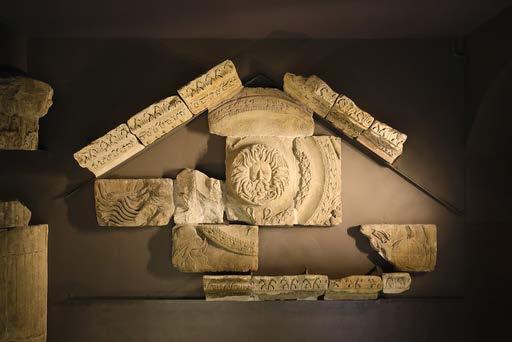
In the modern 21st century, Bath has become the leading centre of English high society (outside of London) making the city affluent with literary influences and associations. Novels from the likes of Jane Austen’s ‘Northanger Abbey’ and Dickens’ The Pickwick Papers’ all carefully allude to the satirical nature of the fashionable stages during 19th century Bath progression; cleverly depicted vividly throughout these narratives.

Although sometimes thought of as one, leviathan road stretching from the great Chinese cities of the east to the queen of cities that was Constantinople and further into Europe, the Silk Road, or routes as many now call it, was an entirely different animal. It was not merely one long continuous line, but instead a deep network of Eurasian trade routes, both land and sea, connecting much of the globe, including much of what is now India and the Horn of Africa, in addition to the much better-known parts of the Middle East, China, and Europe. It produced countless cultural identities, promoted trade and prosperity, perhaps even helped catalyse the Black Death from being a deadly, but local, virus into the terror of Eurasia and parts of Africa for countless. But for the effect it had on the world, knowledge about it is scarce, which seems unjust given the magnitude of the events which it helped bring about.
The Silk Road was not the first massive trade network that was able to transport goods and people from one side of the world to another, but it was the first to do so on such a grand scale. The Tarim mummies, a group of mummies found in what is now North-west China, likely contained individuals with ancestry from the Caucuses. This is used as evidence of some interaction between Eastern and Western civilizations and is further backed up by the discovery of Chinese silk in Ancient Egypt. This was on a very small scale though, and the creation of the roots of the Silk Road can be traced back to the Persian Royal Road, which ran 2700 km across the Persian Gulf to the Western tip of Anatolia. It provided postal stations at regular intervals, as well as security from the Persian army, as its original aim was to provide communication across the vast Achaemenid empire, but it was the perfect place to transport goods, leading to an explosion in trade. These roots were further advanced by the invasion of Alexander the Great and the actions of the successor states to his empire, such as the Seleucid Empire, as it led to further cultural ties between Greece and Southwest Asia.
The Silk Road was initiated by the Han dynasty with their conquest and exploration of much of Central Asia. In 130 BCE embassies were sent to the Kingdom of Danyu, the Bactrian country of Daxia, as well as Mesopotamia, and Parthia amongst others, whilst the Han dynasty engaged in a series of wars with the Xiongnu, a confederation of nomadic peoples. It is unclear what the motives for this expansion were, but it is usually narrowed to two main reasons; the Han wanted more allies to deliver a crushing defeat to the Xiongnu and they wanted to gain greater access to the sophisticated urban civilizations of Parthia and Bactria, especially to trade horses. This is because the soil in China lacks selenium, which is linked to a lack of muscle in horses, meaning that a Chinese horse could not hold a soldier’s weight. The horses of Central Europe however were much stronger and were highly prized in China, being called heavenly horses. After this period the Silk Road, although in its infancy, was very much born.
The Silk Road provided an opportunity for the two most powerful civilizations of Eurasia in this early period; the Roman Empire and China, to interact. Encounters between Rome and China had happened before: occasionally Roman troops fought as mercenaries for the Xiongnu in some of their many wars against the Han dynasty. However, it was the Silk Road that allowed the two states to interact with each other in a limited manner. Chinese silk, jade, and porcelain soon found their way into Rome, whilst Roman glassware, wine, and gold were often sent in the other direction. Ambassadors are reported to have travelled to both states, but the evidence for this is not fully clear and they could have just been traders, instead of diplomatic envoys. China viewed the Roman empire as a very powerful kingdom, equal to China itself whilst Rome had a much more degrading view of China, viewing them as a decadent empire that went against Roman stoic ideals. Because of the great distance between these nations, few traders saw the full extent of the Silk Road, with most going to a city a few 100km away and then selling their goods.
The Silk Road, instead of being a passage between Europe and China, was instead a decentralised trade that passed through countless other places, enriching some whilst securing the demise of others. The riches that passed through areas evolved many tribes from isolationism into the role of marauders or mercenaries, capable of forging powerful empires, such as the Kushan empire. It enriched several cities with incredible levels of wealth, creating gigantic cosmopolitan cities such as Samarkand. It had a huge influence in elevating the Islamic world, especially under the Umayyad Caliphate, who built Baghdad into one of the great cities in the world, and the biggest on the Silk Road. Acting as a centre of trade for their entire empire, Baghdad soon became a thriving hub of Islamic scholarship, developing and translating the ideas of ancient Greek philosophers and doctors as well as Islamic teachings. The Silk Road was hugely influential in creating the wealth to sustain such a sight, as well as bringing paper-making technology from China to allow the House of Wisdom, the greatest library in the world and a centre of learning n for many years until the Mongols burnt it down when they captured Baghdad in 1258.
The Silk Road had been in a period of decline ever since the An Lushan Rebellion, in which the Yan dynasty staged a revolution to put themselves back on the Dragon throne, but despite the Tang dynasty's victory China as an entity was significantly weakened, causing the Silk Road to lose one of its main components. The Silk Road was strengthened by the Turkic Islamic Kara-Khanid Khanate, but only really regained its earlier strength under Pax Mongolia, a period where the Mongol empire held all the territory in Central Asia from China to Baghdad. At first, the Silk Road was used by the Mongols as a highway towards the rich cities of Central Asia, such as Samarkand, which was burnt to the ground in 1220. This destructive force continued across the Silk Road, culminating in the destruction of Baghdad by 1258. The Mongols, although a nomadic people, wanted to establish a capital on the Central Asian steppe, and a flow of artisans, traders and scholars were fed back to the origins of the empire. Because of this, the Mongols had a stake in keeping the Silk Road safe, and under Pax Mongolia, trade flourished, encouraged by the Mongols as a useful way of spying on their neighbours. It was under this that the Venetian merchant, Marco Polo, made his famous journey along the Silk Road to meet Kublai Khan, and his documentation of this opened Western eyes to some of the customs in Asia and somewhat reduced the idea that Europe was the centre of the world. It was only with the decay of the Mongol Empire in the 15th Century that the Silk Road fell from grace, though poetically it was the very gunpowder that it transported from China to the rest of the world that ensured its downfall, as sedentary civilizations learned to combat the nomad power of the Mongols through guns
The Silk Road was also instrumental in spreading some of the major religions of today. Christianity was spread as Nestorianism by traders as well as missionaries along the Silk Road and had many enclaves, particularly prevalent in Iraq and Kurdistan, but these communities were wiped out by the Mongol leader Timur in the 14th century. It was Buddhism that was the main religious beneficiary of the Silk Road and the connections that it created. It was the first large-scale missionary movement in the world, with Buddhist monks first travelling around China and India in the 1st to 2nd centuries CE. During this period several different schools of Buddhism emerged, with some of the earliest being the Dharmaguptakas and the Sarvastivadins, but they were soon superseded by Mahayana, which stressed the unimportance of material things, although this was not always followed, and Mahayana Buddhism remains one of the two main strands of Buddhism today.
In conclusion, the Silk Road was a highway for cultural and religious exchanges and provided fertile grounds for trade that many believe to be the first instance of globalisation. In fact, without the Silk Road, it is difficult to imagine what the world would look like today, given the technological advancements, religious conversions, and deadly diseases carried by this humble trade route

Other than her Majesty the Queen’s death arguably the most important death of this year was Mikhail Gorbachev’s. Gorbachev was the last of Premiers of the USSR or Soviet Union. He is hailed as being the man who is responsible for the end of the Cold War which had lasted for about 4 decades and also for having avertedly caused the collapse of the Soviet Union.
However, Gorbachev in many ways was not the great liberty giver and reformer we see him as today. He was at heart a Communist who believed in Lenin’s ideal of a true Marxist state. What distinguished Gorbachev from former Soviet leaders like Lenin, Stalin, Khrushchev, and Brezhnev is that he believed two very important things.
Firstly, there is his belief that for a Soviet citizen to have value and satisfaction for their work then they must be free to speak openly about their government and their own working conditions. Secondly, he showed that he believed in the right of the eastern bloc countries, known as the Soviet satellite states, to vote for or against communism and they should not be forced by the Soviet Union to share the same political ideals.
These are the beliefs that made him so beloved after the cold war but when it came to the collapse of the USSR it was a different story. Having let the Soviet satellite states become democratic capitalist states one by one, Gorbachev’s policies to the Soviet states were very different.
In March 1990 the leaders of Lithuania told Gorbachev on a visit their wish to be independent. However, Gorbachev was uncompromising in his demand for them to stay in the USSR. However, the people of Lithuania started to declare independence anyway. Gorbachev was forced however to deal with a similar situation in the Muslim Soviet state of Azerbaijan. He then did what Soviet leaders had done many times before and sent troops to stop rioting and try to stop the independence movements in both Azerbaijan and Lithuania. But by July 1990 many other Soviet republics started to declare independence. Gorbachev was still trying to stop these peoples from gaining independence when in October he received the Nobel Peace Prize for his efforts in ending the Cold War.

In March 1990 the leaders of Lithuania told Gorbachev on a visit their wish to be independent. However, Gorbachev was uncompromising in his demand for them to stay in the USSR. However, the people of Lithuania started to declare independence anyway. Gorbachev was forced however to deal with a similar situation in the Muslim Soviet state of Azerbaijan. He then did what Soviet leaders had done many times before and sent troops to stop rioting and try to stop the independence movements in both Azerbaijan and Lithuania. But by July 1990 many other Soviet republics started to declare independence. Gorbachev was still trying to stop these peoples from gaining independence when in October he received the Nobel Peace Prize for his efforts in ending the Cold War.
In April 1991 Georgia became the second state to successfully separate from the USSR after Lithuania. Gorbachev had temporarily succeeded in curbing independence in the other states. However, many in the Communist party and the military weren’t happy with how Gorbachev was running the USSR and wanted to safeguard Communism in the Union, so they orchestrated a coup in August and took control of the Capital city of Moscow. They even placed Gorbachev under house arrest in the Crimea where he had been holidaying. The Coup was eventually put down by the Russia people led by the president of the Russian SSR Boris Yeltsin.
However, when Gorbachev was returned to Moscow after the Coup his position was very weakened. He spent the last months of the Soviet Union trying to keep the nation together peacefully, but it was far too late. One by one like the satellite states had gone the soviet republics became independent nations. By December 1991 Gorbachev was forced to dissolve the Soviet Union. So, looking back over his years in office it is clear to see that Gorbachev was complicated. His leadership was not black and white, but it is clear that he was intent to trying to preserve the nation he believed in to the very last even at the cost of peoples freedom. Therefore, when people speak fondly of his actions in bringing an end to the Cold War perhaps it is best to respect the actions of person not the person themselves as no one is ever perfect.

The debate about abortion within society is one that has polarised nations for centuries due to its greatly contentious nature. To be "pro-life", is to believe that woman shouldn’t have the freedom to choose to have an abortion, and therefore be unable to terminate an unwanted pregnancy. To be "pro-choice" is to hold the opinion that women deserve bodily rights, and that what happens to their bodies should be the choice of no one else but their own.
By Lotte Grech L6
Roe V Wade began in 1969 when a Texan woman named Norma McCorvey - Jane Roe being the fictional name she used to protect her identity - wished to terminate her unwanted pregnancy, after also having previously given birth to 2 babies that she was forced to give up for adoption. At this time, the law of Texas stated that an abortion could only be allowed if the woman's life was in danger, and therefore the choice of having an abortion did not exist. Roe was in a state of desperation, and decided to call upon two lawyers with an interest in challenging the abortion laws, by the names of Sarah Weddington and Linda Coffee. They filed a lawsuit against the district attorney of Dallas County (where Roe lived), Henry Wade, suing him, as they argued that the Texan law violated a woman's constitutional right to privacy, and the right to live without government intrusion. The court of Texas believed that it would be illegal for the state to ban their law against abortion, due to the laws of the constitution. Therefore, Roe and her lawyers appealed to the Supreme Court of the United States. By this time Roe had been forced to carry her child to full-term and then put them up for adoption, but she knew she must change this law once and for all, for all the other women in the US in positions like hers. Success was achieved as on the 22nd of January, 1973, the Supreme Court not only struck down the Texas law banning abortion, but also legalized the procedure for the whole of the USA.
However, in 2022 the court deliberated on Dobbs V Jackson Women's Health Organisation, a case that looked at the state of Mississippi wishing to ban most abortions after 15 weeks of pregnancy. Lower courts had said that this was unconstitutional due to Roe V Wade, as Roe ensures that states are unable to prohibit abortion before 23 weeks. Therefore, unfortunately, on the 24th of June 2022, the case was taken to The Supreme Court of the United States. The Court ruled 6-3 in favour of the Mississippi law being passed, and therefore in this process the court overturned Roe V Wade, after it had stood for almost 50 years.
This decision meant that the laws surrounding abortion are now determined by decisions made by the individual states, putting the lives of thousands of woman in danger, as over a third in the USA have now lost access to abortion. Some laws in the most extreme republican states include Arkansas; in which the act of having an abortion is punishable by up to 10 years in prison, or a fine of up to $100,000 (except in cases of life-threatening pregnancies). In Missouri, a trigger law banned all abortions, and to have an abortion is a class B felony - which
Artwork by Freya Bradfordcould leave you with a 5-15 year prison sentence (except in cases of life-threatening pregnancies).
Tennessee have gone to the extreme that even in life-threatening cases, a court must permit the abortion to take place, before the mother is allowed to have her life saved from an abortion. In Texas, providing an abortion to a woman in need is now punishable by up to life in prison, and state have threatened that fines can be up to $100,000.
However, not all hope has been lost. On the 8th of November of this year (2022), the USA held its Midterm elections, and it appears that victories for the reproductive rights movement are being won across the country. The Midterm elections are for Congress (who make the USA's nationwide laws), and is made up of two parts - the House of Representatives and the Senate. The House decides which laws are voted on, while the Senate can block or approve them. All the seats in the House of Representatives have been up for election, alongside one-third of the Senate. The Congress and the Courts balance each other, with Congress making the laws, but the Courts interpreting them - and with The Supreme Court (who are superior to the lower-federal courts) having the power to decide if a law fits the meaning of the Constitution.
The overturning of Roe V Wade by the Supreme Court has given a boost to the Democrats on the side of voters, as they are the ones who support women having the right to choose, and have made that central to many of their campaigns. Currently votes are still being counted, but if the Democrats manage to hang on, President Biden will be able to more easily continue with his plans to protect abortion rights. However, if the Republicans are able to take control, then they will be able to effectively grind that agenda to a halt. As the results are beginning to come through (with it currently being the 10th of November), we have, for one, seen an amendment to Vermont’s state constitution establishing the right to “personal reproductive autonomy”. This was approved by voters on the 2022 midterms ballot, with the amendment stating that "an individual’s right to personal reproductive autonomy is central to the liberty and dignity to determine one’s own life course, and shall not be denied, or infringed, unless justified by a compelling state interest achieved by the least restrictive means". Furthermore, previously Montana weighed in on a law declaring that an embryo or foetus is a legal person with a right to medical care if it is born prematurely or survives an attempted abortion. This type of so-called 'born-alive law' has the ability to impose criminal charges upon health care workers who don't try to save what the proposal has called 'a born-alive infant' or fetus. Charges have been declared up to 20 years in prison and up to a $50,000 fine. However, fortunately, voters are largely appearing to be rejecting this initiative.
You may be wondering what we can do in the UK to help women in the US? Currently, The BPAS (British Pregnancy Advice Service) has a petition calling for the UK government to publicly condemn the bid to overturn Roe v Wade. This would produce a clear message and signal to other countries, that the UK government does not stand for this appalling breach of human rights, and that they wish to commit to supporting to abortion care around the world. BPAS understand that thousands of mothers all around the United States have been plunged into desperate situations, as their bodily autonomy has been taken away, but their needs haven't. Many vulnerable and desperate women are now being forced to take matters into their own hands, so they don't have to bring an unwanted child into the world. This includes resorting to illegal - and potentially unsafe - methods.
Furthermore, I must point out that whilst reproductive rights are being stripped in the US, the UK is currently facing it's own battles as well, and these are not being talked about enough. Despite being legalised in 2019, abortion provision in Northern Ireland remains almost non-existent. Women seeking abortions are often forced to travel hundreds of miles, often alone and at great expense. Incredible charities such as Abortion Support Network are avaliable to donate to, and will offer the vital support needed for these women to access an abortion, and continue to fight for easier access to abortion services around Northern Ireland.
To conclude, I urge the reader of this article to consider the terrifying fact that when oppressors reach the realisation that they are able to successfully strip back human rights, they tend to only want to take them away more and more. Therefore, if female reproductive rights continue to be stripped back by superpowers such as the USA, we may soon find our societies in a "Handmaid's Tale" situation. "Pro life is 'I know what's best for you.' Pro choice is 'you know what's best for you.'" To be pro-life is believe in domination over human beings, and, to publicly reject faith that women are the only ones truly aware of what is best for them, and what is best for their bodies.
For years, Big Science and the global elites have pushed the narrative of a large expanse of water in the world known as "the sea". This claim has been supported for years by various media outlets, with propaganda from films such as 'Blue Planet' or 'Jaws', leading to the general assumption that the sea exists.
This is not true.
In order to get to the root of this issue, it is first necessary to realise the impracticality of "the ocean". It would hold very little use for economic development, since one cannot build or farm on it, so it would have quite a negative impact on the global real estate market. Additionally, there cannot be room for so much water because that's where all the plastic is stored, thus the plastic is either put somewhere else, or, more likely, there is no water there in the first place. Such a large body of water may be adequate for kayaking, but it generally lacks any opportunity for possible monetisation (eg. golf courses).

You may wonder how such an idea has emerged so defiantly in the first place. In 1577-1580, Sir Francis Drake claimed to circumnavigate the globe. The journey took three years - not because of the distance he travelled, but because he was slow. Since his adventure, scientists and explorers continued to vastly overestimate the size of the ocean, until in 1978 NASA launched a project to find a definitive answer. They suggest that it makes up around 160 million sq miles, of the earth's supposed 196 million sq miles.
No singular person walked this distance, so we are led to believe the figure solely based on a satellite study (clearly too far away to know for sure) and it is likely that an extra 0 was added to their final measurements, for media attention or an innocent mistake. Additionally, it is stated that only 5% of the ocean has been explored. The reason for this is, once it was found, they realised that that's all there is.
NASA continues to push this blatant lie. They claim that less than 1% of the Earth's water is safe to drink, which, were it true, would be incredibly unhealthy. How can we be expected to live in a world where only 1% of our most basic resource is safe to consume? How are we to know where it is?
Fictional artwork by Emily PughWhilst it is important that this message is brought to public attention, there has been attempts to silence this truth. Most commonly heard is "How could you suggests it doesn't exist, when I can sea it?" Ignoring the blatantly terrible pun, you cannot be seeing the sea. It does not exist. What you are seeing is a small lake, or awkwardly placed river. For example, Weston Super-Mare is only a distant puddle, and an overly wide river encircles the coast. Planes play video loops of blue water whilst travelling to France (the pilots are in on it), and waves are created by large turbines (powered by oil).
Large boats patrol the rivers to deter any travellers from going too far, and sea creatures are government drones.
As well as this, the entire fishing industry is a sham. Fish are created in factories in Venezuela and exported across the globe, supported by a slightly smaller operation in Cambodia. When supplies are low to craft them, the base material (jelly) is replaced by rubber, accounting for the unpleasant taste. Whilst there are many campaigns against overfishing, it is merely a strategy to lower the demand for fish to save rubber for important things, like creating tyres to burn.
The initial motivation for fabricating such deceit on a global scale is to save top scientists and elites from embarrassment. They are the ones peddling this conspiracy, they are the reason that the lie of the sea has permeated minds and threatened the truth. I maintain that it is vital that this truth is brought to public attention, and I urge you, dear reader, to spread this truth. As it becomes more known, so increases the horror of the global elites as their worlds fall apart with a simple realisation. I push no other agenda - the moon landings were real, the earth is round (since the idea of an ocean and round earth are incompatible - it would slide off), but remember and know one thing.
The sea is not real. Reject the sea.
By Billy Skiggs L6
“Why do I smile at people who I’d much rather kick in the eye?”
–The Smiths, Heaven Knows I’m Miserable Now
There was a time in my life, where I bit a classmate’s big toe for no apparent reason. Later in the inevitable castigation that follow these petty happenings the teacher mentioned an earlier wrongdoing upon a female classmate by this student whom I’d bit. I had played along then, pretending it was indeed an act of revenge for said classmate. In truth, I did not care for the girl at all, I had bitten him for the sake of it. It did not occur to me at the time, but this would be the first recollection of spite in my memory.
In a smaller scale, some bacteria release toxins called bacteriocins that kill other bacteria. In many cases this happens to kill the aggressor bacteria too. This self-destruction has proved to be successful in the furthering of the bacteria species. Spite might very well be a universal trait that permeates throughout existence, as a toddler through a supermarket enacting a child-like entropy upon the perfectly stocked isles. But spite does not care about the furthering of the species. To hell with them, she says. Spite stands idly with her arms crossed shaking her head in disapproval, the gold Cartier Crash on her wrist glinting a subtle defiance.
“‘Ha, ha ha! Next you’ll be finding pleasure in a toothache!’ you will exclaim, laughing. ‘And why not? There is also pleasure in a toothache,’ I will answer.”
-Fyodor Dostoevsky, Notes From The UndergroundIn Fyodor Dostoevsky’s existentialist masterpiece Notes From the Underground, Dostoevsky raises the idea that human existence is reducible to our quest to find happiness with rational means. Do we really have free will if all we ever do is good and reasonable? Dostoevsky’s Underground man believes that to defy any logic and choose to make bad decisions is the quintessence of free will and humanity; to choose the negative just because you can, out of spite for the reasonable. Freedom is the most real when it does not involve any intentions of felicity or contentment; to choose to suffer is to choose to be human.
“I see what is right and approve, but I do what is wrong.”
-Anthony Burgess, A Clockwork OrangeMan is not a piano key. In spite, the will of man evades reason. Spite is the footnote under antisocial behaviour, it brews a mild hatred in the heart, devolving into resentment. There is an underground man in you, and I, and them, too.


Tried passing off Air Forces as 'school appropriate footwear'
Bought something from the school tuck shop every day for a week
Visited the Co-op before prep for a much needed sugar boost (we're looking at you fifth form!)
Been tempted to play games on my PLD during lessons
Been caught playing games on my PLD during lessons
Been scarred by having an unflattering picture pop up on a notice board around school for all to see
Tried relentlessly and yet still failed to figure out how to book an activity on SOCS
Engaged in (or been caught in the crossfire of) a water fight during a Chemistry practical
Snuck into the lunch hall before my slot
Defied the shiny green fence and snuck up the bank
Hold up both hands and bring down a finger for every one of the above you have done.




The right to protest freely without persecution. The right to appeal using human rights claims without any hindrance. The right to have protection for migrant and asylum-seeking children. How would you feel if any of these vital rights were stripped from the UK? This could soon become a reality under the new bill the government are trying to enforce - the new Bill of Rights.
Firstly, what exactly is the new Bill of Rights? And why is it so harmful that the Bill of Rights is possibly replacing our longstanding Human Rights act? To understand this we need to understand the importance of the Human Rights Act, which has been acting as an invisible safety net for UK citizens without a majority of people realising.
The Human Rights act (1988) was first drawn up in 1951 after the atrocities of both the First and Second War. Society demanded change so the Council of Europe drafted up the European Convention on Human Rights. However the protections stated in the Convention didn't come into force in the UK until the 2nd October 2000, where it became standard British law. The Article sets out our human rights in a series of articles, which each deal with a different right. These range from a multitude of rights, including the right to freedom slavery and force labour, the right to a fair trial, freedom of expression and many more. These articles gives you the tools to protect your rights in the UK and helps you to hold public bodies and government to account. You are able to seek justice in British Court if you have been a victim of a human right violation, and public bodies are required to respect your human rights. However, the new Bill of Rights is putting all of this at risk. The Bill's stated purpose by the Conservative Party is to ''clarify and re-balance the relationship between courts in the United Kingdom, the European Court of Human Rights and Parliament'' and give primacy to decision-making by Parliament, rather than any court, in instances where competing rights and interests are at stake (clause1(2)). Now this doesn't seem too dissimilar to aims of the Humans rights act, but it unfortunately is very harmful. The Bill would significantly change the means by which human rights are protected and enforced in the UK. It would make it harder for people to bring human rights claims by introducing a ''permission stage,'' requiring them to prove that they have suffered ''significant disadvantage'' (clause 15). The Government says this is necessary to weed out ''trivial cases.'' These new hurdles will particularly harm minority and vulnerable groups as human rights are turned into a privilege which are only afforded to people who are deemed ''worthy'' by the government. The ambiguity of these new clauses are also especially dangerous as it allows more room for incorrect rulings to take place, which again fall at the detriment of the vulnerable and prejudiced groups in society. The Bill also provides that courts must give ''great weight'' to the importance of ''freedom of speech'' (clause 4). However there are certain exceptions; individuals cannot rely on this provision in criminal proceedings, or matters relating to immigration, citizenship or national security. It also makes it easier to deport foreign criminals by restricting their right to appeal using human rights arguments, which makes them easier to be subject to persecution if they're sent to places of torture (which is a very possible situation). Does that seem like a fair and equal country to you?
A suitable example of the Human Rights Act coming into force was during the case of Ghaidan v Godin-Mendoza in 2001. Since 1983 Hugh Wallwyn-James had been living as a statutory tenant in Cresswell Gardens, London with his long-term partner, Juan Godin-Mendoza. In 2001 Wellwyn-James passed away and his landlord, Ahmad Ghaidan, sought to evict Godin-Mendoza from the household. Under the Rent Act 1977 the surviving spouse of a deceased partner is entitled to take over tenancy, with 'spouse' defined as any person who lives with 'his or her husband or wife.'
According to the Judicial Committee of the House of Lords, in the earlier case of 1999 FitzPatrick v Sterling Housing Association, this provision was not available for same-sex couples. However since then, the Human Rights Act 1988 had come into force. The act supported Godin-Mendoza's claim under two of its rights : Article 8 - which guarantees a right to private and family life and Article 14 - that requires that all Convention rights are exercised without discrimination. Godin-Mendoza argued that the Rent Act 1977 discriminated against him due to his sexual orientation - a violation of Article 8 and 14 - as he was treated unequally compared to if he was a heterosexual widow. This allowed him to go on to win the case, preventing him from being evicted from his home. If the Bill of Rights had been in place, the uncertainty of the bill could have made it impossible for Godin-Mendoza to receive justice, as if the ruling was left at the discretion of the court an incorrect prejudiced ruling possibly could have taken place.
So how is Amnesty International fighting to make a difference and prevent these changes from happening? A petition was instantaneously set up by the Amnesty organisation, which allowed the problem of the application of the new Bill of Rights to be debated in parliament. Two of the UK's biggest human rights organisations (Amnesty and Liberty) joined forces in an advert take-over of ConservativeHome and LabourList on the 15th of November urging the scrapping of the Bill of Rights Bill. The banner ads showed Bill of Rights crossed out and replaced by ''a complete mess'' - quoting a government source from September 2022 when the bill was shelved by the former prime minister Liz Truss. This made MPs and society aware of the extent of the dangers of the bill, and the need to bin it immediately. The UK chief executive of Amnesty International (Sacha Deshmukh) also challenged the bill in the government, calling it a ''draconian plan' and a 'rights removal bill.''
As you can now see, the new Bill of Rights is a disaster for the UK if it ever comes into place. Without the Humans Rights Act, COVID victims wouldn’t have been able to demand a full inquiry to hold the Government to account, people wouldn't have been able to successfully challenge the police banning women from holding a vigil for Sarah Everard, and victims of the Hillsborough tragedy would not have got justice. Scrapping the Humans Rights Act and replacing it with a diluted version of humans rights would have a negative impact of the UK's long withstanding advocacy for human rights, losing their legitimacy to speak out about other human rights issues around the world. I believe all human rights should be secured to everyone without discrimination, no matter their background. And you should too. Human rights are a necessity, not a privilege.

















As a self-described bookworm it was most exciting to me when the literary world exploded with controversy a few months ago. The issue at hand, the beloved works of children’s author Roald Dahl. Unless you’ve been stuck in the Love Island villa, you’ve probably heard that Puffin Books are proposing a ‘rewrite’ of the Roald Dahl books to allow them to ‘continue to be enjoyed by all children today’. Fear not dear reader, I am not going to spend this article boring you with the details of the ‘freedom of speech’ vs. ‘the right to offend’ argument, I feel this is a topic which has been debated on Good Morning Britain one too many times to be considered original at this point. Instead, I want to write about the real issue which this whole situation brought to light. What do we do with books whose content, tone or message are deemed to be offensive to some?
I thought back to the first time I had ever been made uncomfortable, or even offended by a book. It was the summer following my GCSEs and, whilst my skin was coated with a sticky layer of insect repellent on a humid August day in Southern France, I decided that in a blatant attempt to impress my future teachers I would get a little preview of the English A-level curriculum. Partly fuelled by my need to assert my academic prowess over my peers, and also partly motivated by the frankly stunning copy I procured in Waterstones, I started reading Nineteen Eighty-Four by George Orwell. I was immediately captivated by the prophetic nature of the novel and, as a lover of the dystopia genre, it is safe to say that this was precisely my cup of Victory coffee.
However, there was one thing that bothered me throughout the book. The way Orwell writes about, and the way his protagonist, Winston Smith, thinks about women. Unfortunately, despite this work being a stroke of genius, Orwell very much falls short of the feminist icon status that I was hoping he would achieve in my mind. From the way he writes about Winston’s ‘frigid’ wife Katharine who had, ‘not a thought in her head’, to the way he links his love interest Julia’s sexuality to his previous encounter with a prostitute, it all made me very uncomfortable. I’m not saying this is exclusively an ‘Orwell’ issue, in fact a quick scroll through Wikipedia will confirm that problematic depictions of women are rife in literature throughout history.
After thinking long and hard about the subject I have come to the conclusion that what needs to be done is … wait for it… nothing! Hold on, before my words trigger a Twitter frenzy let me confirm that I am not trying to invalidate the emotions of people who feel offended when reading books. I’ve been there and it’s not exactly pleasant. But I truly believe that to ban these books and deprive people of the right to experience these stories, and form their own opinions about their content, is not a way forward.
The concept of ‘rewriting’ the work of another person who is no longer here to consent to any of the changes feels like incredibly murky moral territory. Not only are we seizing the intellectual property of another individual but also it feels as though we are forcing modern ideals onto a text which, in Roald Dahl’s case, is older than my parents. If we start allowing publishers to
rewrite author’s work because it is deemed ‘offensive’, where do we draw the line? Should we ban an author’s work because of their personal views, like Orwell’s homophobia, Dahl’s antisemitism, or Rudyard Kipling’s racist views? Salman Rushdie, a novelist who has literally spent years in hiding due to the controversial, or ‘offensive’, nature of his work tweeted ‘Roald Dahl was no angel but this is absurd censorship’, acknowledging that although Dahl was by no means perfect and his views did not align with our modern moral compass, this does not mean that his work should be censored.
The above authors have produced some of the most inspiring and revolutionary literature ever written, enthusing my fellow students and I to expand our knowledge and opinions, spending hours pouring over their library of work. To deprive them (and me!) of this experience in an effort to shift the moral compass is about as sensible as locking a child in 'The Chokey' for getting a bad mark on their spelling test. At risk of sounding geeky, reading Nineteen Eighty-Four was a pivotal moment in my love for books. It was the first time I felt I could see the real-world implications and societal impact of a piece of literature. I even credit Orwell’s work with being part of the reason I want to study literature to this day. So, to deprive future generations of their right to engage with these works of the past (à la Ministry of Truth) is criminal and we simply cannot allow the voices and messages of these authors to be lost, no matter how unpopular they may be. Because ultimately ‘If liberty means anything at all it means the right to tell people what they do not want to hear.’
 By Victoria Corfield L6
By Victoria Corfield L6




Everyone knows about climate change. Everyone knows about the consequences of climate change. Yet it feels like an issue that’s swept under the rug by our world leaders, leading corporations, and most other important people; a problem for future generations to deal with -us. Many of us are already seeing the effects of climate change on the news and some before our very eyes. Droughts, famine, declining biodiversity, and extreme weather are a minute portion of the repercussions. However, some of the poorest areas of the world are experiencing nearly all of these first-hand, despite contributing to climate change the least. We are part of the richest 10% of the world and consume 20 times more energy overall than the poorest, and although climate change is not on our doorstep in the way it is to others, we must take responsibility for our carbon footprint.

At Prior, many of us have been striving to minimise our carbon footprint. One of our main focuses is the level of biodiversity around the school. We have such vast, beautiful grounds that surround the College, we can’t ignore the importance they have. Biodiversity is the variety of all life on Earth, including animals, plants, and microorganisms. It is essential to humans, giving us raw materials such as food, fuels, and fibres. We depend on biodiverse ecosystems for regulating climate, waste, and pollination. These ecosystems are more stable with a wider variety of species because they can better withstand and recover from disasters and environmental changes. Having more links in the food chain makes everything further up the chain healthier, so it is harder for these species to become extinct. This is why improving our biodiversity at Prior can make so much difference to the health of our flora and fauna on the grounds and in our local area.

So far, our ground staff and gardeners have been incredible in making these improvements. Down at All Saint’s, where English House and Fielding House are, they have restored and are maintaining the green roof of that building, reseeding it with wild meadow seed. Wild meadows are an ecosystem within themselves, with around 150 different species of flower and grass that support bees, butterflies, and other insects, which in turn sustain small animals and birds. Our ground staff and gardeners also maintain fallow areas around the school, again aiding biodiversity. They can be seen along the drive and around tree areas around the school. In front of our grand steps leading from the portico of the mansion, during the summer months, one can find the beautiful Bee orchid that our gardeners have planted. The orchid’s petals mimic the appearance of a female bee, attracting male bees who sadly find no mate, but do pollinate the flower. However, the UK does not have the species of bee that pollinates this plant, so they are self-pollinated. The Bee Orchid is severely endangered, yet it is thriving on our grounds – make sure to look out for it June-July time!
In the wider world, there has been much concern about how climate change will affect the earth we know and how future generations will live with rising temperatures. While the Earth is becoming warmer, ecosystems with decreasing biodiversity are becoming more vulnerable due to the extreme change in the climate. Plants and animals need to adapt to the environment or move their habitats. Climate change increases natural disasters – drought, bushfires, storms, ocean acidification, sea level rise, and global warming – which reduce biodiversity severely.





Global warming also affects marine organisms in the oceans. Corals are extremely vulnerable to rising temperatures. A temperature increase of just one degree Celsius for four weeks can trigger coral bleaching. During bleaching, corals expel the algae that provide colour and become transparent. Without the algae, corals cannot remove waste or produce food in photosynthesis. Orange-spotted filefish dwell in coral reef habitats, and as a result, they are highly sensitive to warm water. It consequently went extinct in Japan during an episode of warmer ocean temperatures in 1988.

Koalas have adapted their defence mechanism to bushfires: they climb up towards the treetop and curl themselves into a ball. However, deforestation is shrinking their habitats and climate change is increasing the impact of bushfires. Koalas are killed in bushfires and gradually lose the ability to survive. Scientists estimated less than 100,000 koalas are in the wild. Earlier this year, the Australian government announced that the koala is now endangered in eastern Australia. Koalas have adapted their defence mechanism to bushfires: they climb up towards the treetop and curl themselves into a ball. However, deforestation is shrinking their habitats and climate change is increasing the impact of bushfires. Koalas are killed in bushfires and gradually lose the ability to survive. Scientists estimated less than 100,000 koalas are in the wild. Earlier this year, the Australian government announced that the koala is now endangered in eastern Australia.
The future of the earth relies on these species for our survival, if one component of the system is removed, the system eventually fails, and our ecosystem will collapse. This could result in mass flooding in all areas of the world, virtually unbreathable air, superbugs and diseases that will kill millions every year, and over half the world without access to decent water. All of this is just predicted for 2050. But don’t panic, just act. Keeping pressure on the UK government to move towards a greener, carbon-zero future, buying food from local areas, and being more conscious of our transport and travel.
For the future of Prior Park College, Eco-Prior aims for the climate crisis to never slip from our minds, always present in every decision we make. Alongside the ground staff, gardeners, SLT, teachers, and students, Eco-Prior is striving to make it a cleaner, more sustainable, and friendlier place for wildlife and their habitats. We have plans to maximise the amount of wild growth on the grounds and restore the ponds found around All Saint’s. Increasing the number of trees at Prior will not only improve the biodiversity but also provide more habitats for wildlife and remake the historic view of Prior to what it was when first constructed. We are so lucky to learn and work in such a beautiful place and we must do all we can to protect and preserve it.
BY SEREN JOHNSON STEFIUK U6 HAZEL CHU U6
Firstly, I should introduce myself: my name is Luna Parsons. I use all pronouns, although I would describe myself as a trans woman, and I'm also pansexual and demisexual. Don’t worry, I know it’s probably a lot of unfamiliar words, but I promise I will explain some of them. I thought I would write in this year's magazine on a topic that, though discussed, isn’t always talked about in the right way. I know this doesn’t go for all straight people, however, there have been some that honestly believe that now gay couples can marry all their problems have disappeared. I’m sorry to say but that simply isn’t the case.
The first point I want to speak about is the distinct lack of education surrounding everything to do with the LGBTQ+ community. Many people don’t even know what the letters stand for in the name, (Lesbian, Gay, Bisexual, Transgender, Queer. Just in case anyone needed a refresher!) let alone all the other names for the more obscure identities. For example, earlier I described myself as pansexual (love regardless of that person's gender) and demisexual (not finding someone sexually attractive unless already in a relationship). Along with a lack of knowledge most people, especially around the teenage years, don’t really have an idea of boundaries. I have personally been asked by multiple people in-depth questions about how trans people have sex, which is a topic I know little about.
Another issue that I want to raise is, as I hinted at in my intro, how many people don’t understand how to talk about these problems. This links back to the last point and how if people haven’t talked about these problems before they won’t know how best to speak about them now, and how far they are allowed to go. One key example of this idea was from when gay marriage was being passed around the houses of parliament and David Cameron, exprime minister, said “I’m in favour of gay marriage because I'm a massive supporter of marriage and don’t want gay people to excluded from a great
Artwork by Jess Metcalfe
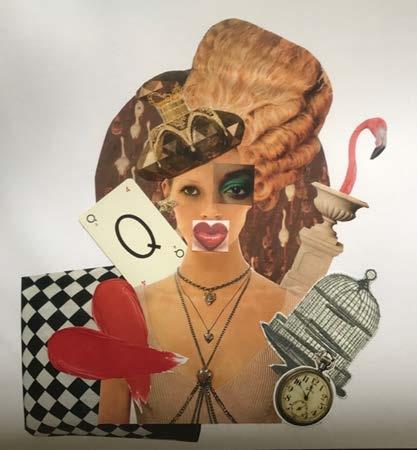 Artwork by Evie Rayner-Bentman
Artwork by Evie Rayner-Bentman
institution.” As much as getting a gay marriage legislation through parliament is a wonderful thing, this statement has always sounded slightly off to me. That is because Cameron isn’t out-right saying that gay people should be allowed to marry due to it being a basic human right to allow people to love without any hindrance at all, he is instead saying that he is in support of the idea of marriage rather than in LGBTQ+ issues.

I’m not completely sure what to call this last point I have but I’ve wanted to talk about it for awhile. About a year ago, I had a friend of mine come and talk to me about someone they found out liked them at the time. My friend explained that this person was non-binary (a gender that is separate from the typical gender binary of boys and girls) and said that they wanted to know if it was ok to ask which sex (what your assigned at birth) this person was. I said that it isn’t ok unless they tell you themselves and also that my friend should think about what they want from a partner at this age. I know it sounds silly but is it really that important to know what genitalia the person you're dating has at 13? If my friend had asked that person which sex they were, how would you feel to know someone is only interested in you because you were placed in a category that you no-longer fit into?
When I set out to write this, I really just wanted to highlight some issues I’ve experienced being queer in the world today. I hope that in some way I’ve made you stop and think about some of the complications that come along with being part of the LGBTQ+ community. This hasn’t really been intended to answer anyone’s questions or push them in the right direction. And anyway, it was more to make you think about a topic that can be and does get overlooked. Hopefully now you can go off on your own and do some research for yourself or if you want to come and talk to people in the school about anything you are more that welcome to come to the equality community by contacting me.
By Luna ParsonsBy the PPC Equality and Diversity Committee

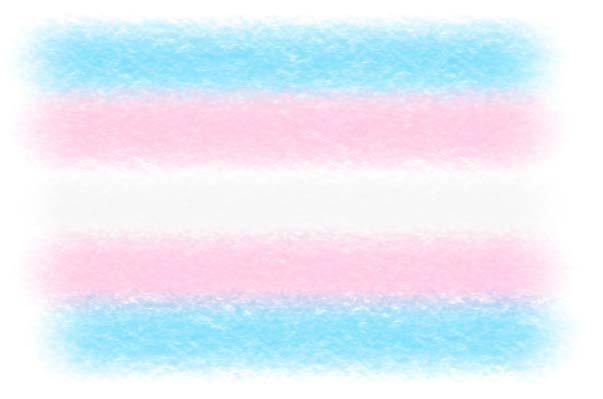
Match up the Pride flags with the terms below!





Bisexual Bisexual Bisexual
An attraction to more than one gender, but not all genders
A message from the PPC Equality A message from the PPC Equality A message from the PPC Equality and Diversity Committee: and Diversity Committee: and Diversity Committee:
Hi! We're the Prior Park Equality and Diversity Committee. We are a group of students passionate about supporting LGBTQIA+ causes who meet every Friday at lunchtime in the wellbeing centre. Feel free to come along if you're a member of the LGBTQIA+ community, or if you're an ally and want to get involved with some of our fabulous fundraisers. For more info please message Ms Riggs :)
a person whose gender identity is opposite to the sex the person had or was identified as having at birth
Pansexual Pansexual Pansexual
Traditional Traditional Traditional gay pride flag gay pride flag gay pride flag
this is the flag most commonly associated with the LGBTQIA+ community and is often used to symbolise the community as a whole
Non-binary Non-binary Non-binary Intersex Intersex Intersex
An umbrella term for those whose bodies do not align with the gender binary of male and female (some people can have both sets of genitals, various combinations of chromosomes or more differences)
Where a person feels sexual, romantic or emotional attraction towards people regardless of their sex or gender identity
Asexuality is a spectrum of attraction and can include people who don't feel sexual attraction at all or who only feel sexual attraction under a specific set of circumstances
People who identify outside the gender binaries of male and female. Often nonbinary people people use a blend of binary pronouns or the pronouns they/them to better express their identity

Fracking and its purpose:
Fracking, also known as hydraulic fracturing, has been a topic of much controversy in recent times due to the surrounding politics and mounting negative research. Many of us might not understand the process of fracking and its purpose. By way of explanation, hydraulic fracturing consists of drilling down 2-3 kilometres into the earths crust and then horizontally injecting fluid at high pressures (up to 100 mega pascals) to open fissures in the earths crust. This process allows the trapped shale gas and crude oil to flow through a pipe that extracts it for our consumption, for example, to generate electricity to heat our homes and to cook our food. Fracking has been a process used since the 1940’s but only since the 1990’s has fracking become modern practice.
Production, benefits and burdens:
In 2021 Russia provided Europe with 40% of their energy. The purchase of energy from Russia by European countries finances the war between Russia and the Ukraine, however, stopping the purchase of energy from Russia would result in Europe suffering an energy crisis. Closer to home, Liz Truss (then Prime Minister) lifted the ban on fracking – why did she do this? – to provide energy security for the United Kingdom (UK) in the context of rising cost of living and the demand for fuel. Fracking however carries with it burdens for the UK and across the world. First, hydraulic fracturing uses a large amount of fresh water, for example, one well (depending on its size) can use 6 million to 40 million litres of fresh water - that’s 16 Olympic pools worth. Second, this fresh water is contaminated with chemicals chosen by companies to make ‘slick water’. This slick water is a formula not known to those outside the companies responsible for fracking, but it is understood to have the potential to contain up to 700 different chemical agents – with no ability to clean slick water in treatment plants. These chemicals, including formic acid, benzene and some carcinogen’s, to name a few, are understood to be toxic, with the potential for health risks, for example, inducing vomiting, and causing burning and pain. Third, due to contamination, disposal is also problematic. To combat contamination, countries started disposing the water underground, this however lubricates existing faults, for example, scientists believe fracking causes human-induced seismicity. An illustration of this in 2011 were tremors of a low magnitude recorded near Blackpool at sites of drilling. Such tremors have also occurred around the world at sites of fracking, including an earthquake of 5.7 magnitude recorded in China. Researchers have found earth tremors from the fracking fluid flowing into geological faults. Fourth, fracking could potentially accelerate climate change as the shale gas obtained contains a high percentage of methane which traps more heat in the atmosphere.


In summary, the potential for harms was balanced by Liz Truss to ensure energy security , however, this may have one caveat - in the UK it is unknown if we have any, or a negligible amount of shale gas under the earths crust, and its location is unknown. The only way to find its location is through drilling down and injecting the fracking fluid. This process, in the absence of product is costly risking environmental and health repercussions –go against the UK Governments pledge for net-zero by 2050.
By Harriet Martin L6
As the UK struggles with rising energy costs and a cost-of-living crisis, nuclear energy has emerged as a potential solution – but is it the right choice for the future?
As the cost of living in the UK continues to climb, the fear of unaffordable essential goods and services is becoming a reality for many – not only in low income households but increasingly in middle income households for whom the shock of higher mortgage interest rates are being felt in monthly budgets. With energy costs on the rise and wages remaining stagnant for many, the future may seem uncertain, but is there an affordable and ecologically friendly solution to this growing crisis? One option that has drifted in and out of favour is nuclear energy, a low-carbon and reliable source of electricity that has the potential to lower electricity costs for consumers.
Nuclear energy comes in two main forms – fission and fusion. Current nuclear energy supplies are entirely provided by fission, which is the splitting up of a nucleus into two or more smaller nuclei. This process produces staggering amounts of energy, consistently and reliably. Fission is the only type that is currently commercially viable, however there are hundreds of companies working on perfecting the process of nuclear fusion, which is lower risk and cleaner than nuclear fission, and negates nearly all of fission’s downsides. However, despite its strengths, nuclear only provides around 5% of the global energy supply.
One of the biggest causes of the cost-of-living crisis we are experiencing is the surge in energy prices, both wholesale and retail, in part due to the Russian invasion of Ukraine but also due to the stranglehold that certain countries and firms have on fossil fuel supplies who are profiting from the crisis. These events have brought to light our reliance on other nations for energy. With the ever-increasing concern regarding climate change and the impacts of fossil fuels, we need energy sources that are both clean and dependable. Interestingly Iceland, the only country to be fuelled by 100% renewable energy (75% hydropower and 25% geothermal) did so not for the environmental benefits, but to release itself from the fluctuations of oil prices that were undermining its ability to provide stable and economically feasible energy for their remote nation – allowing them to become selfsufficient.
The current UK energy supply has a wide range of sources, and it is relatively clean with only 45% being from fossil fuels, most of that being from natural gas. However, of the remaining supply, only 14.9% is produced with nuclear energy, whilst 25% is produced with wind and solar, with the rest being a mixture of other renewables. Unfortunately, options such as wind and solar come with their own challenges – including dependency on weather conditions and the need to create batteries to store energy to be released as times of highest demand. So, there is a need for energy sources which can be called upon when conditions limit the supply from renewables. It is possible that nuclear energy, both fusion and fission, could prove to be the answer for cheap, clean, and reliable energy, produced locally in the UK.
Nuclear energy came to the UK in the late 1950s, with the first commercial-scale nuclear power reactor starting up in 1956 at Windscale. Since then, nuclear energy has been a highly divisive topic, despite its many merits. The industry grew in the period between the 1960s and 1980s, within which time numerous designs for reactors were created and improved upon.
Nuclear energy currently produces around 15% of the UK’s electricity supply, and the energy it does produce is extremely clean, even when compared to other renewables like solar and wind energy. There are, like every energy source, benefits, and drawbacks. However, in the case of nuclear energy, it is abundantly clear that the benefits outweigh the drawbacks. The main benefit of nuclear energy is that is low carbon, unlike fossil fuels are well known for their horrendous greenhouse gas emissions. It is also reliable, unlike wind and solar energy which are highly reliant on ideal weather conditions to produce enough electricity, meaning we cannot have stable supplies of electricity, and they must be supplemented by other sources. Nuclear energy also requires much less physical space than renewables like solar and wind, with a power density of around 1000W/m2 (solar is around 100W/m2 and wind is around 2-3W/m2) so it can minimise harm to local habitats and communities. Additionally, nuclear energy has the potential to be an extremely cheap source of energy, compared to both fossil fuels and other renewables, due to the energy density of its sources. In fact, one uranium pellet creates as much energy as one ton of coal, 149 gallons of oil or 17,000 cubic feet of natural gas.
However, there are downsides to nuclear fission which cannot be ignored. The first one that may come to mind is safety concerns, and the risks of accidents or disasters. Since its inception, nuclear energy has been highly divisive because of the public perception of anything nuclear and parallels being drawn between the energy source and the weapons of mass destruction. The two largest events, Chernobyl and Fukushima have caused many nations to phase-out nuclear power, despite its upsides. Unfortunately, this means that more nuclear power reactors have closed than opened in recent years, hindering confidence in nuclear energy. As well as this, nuclear energy plants can be very expensive to construct, so often government funding is required, which is naturally an issue with divisive projects that the whole population does not agree on. Another concern is how the waste leftover after the fission reaction is dealt with and managed, and where it shall be stored. This is an issue, because spent fuels can remain radioactive for thousands of years and needs to be stored responsibly. In recent years, however, there have been solutions arising for this, including better fuels and reactors, which produce less waste. It is also worth noting that other forms of clean energy, like solar panels, also result in toxic (albeit not radioactive) by-products and waste that can leach into the environment as they break down, whilst also using finite precious metals.
With this all-in mind, it is interesting to explore the role nuclear energy has to play in the future of the UK’s energy supply. It seems clear that the government is highly supportive of nuclear, with intentions to bolster the future energy supply with nuclear, describing it as ‘reliable, affordable, low carbon power that is generated in this country.’ Development of nuclear energy will also create high-quality jobs and boost economic growth within the United Kingdom, instead of importing copious amounts of our energy.
Hundreds of firms around the globe are working on new fission and fusion technologies, in hopes of reaping the benefits of these amazing energy sources. One of the main proponents of nuclear energy is Rolls-Royce who are developing new small modular reactors (or SMRs), to reduce the initial outlay of manufacturing nuclear fission plants, to improve scalability and reduce running costs to meet the rapidly growing energy demand, which will only rise further in coming years, with the use of electric cars and development of further technologies to enhance our every-day lives.
Many believe nuclear energy will play a pivotal role in meeting global climate goals, as other clean energy sources lack the reliability that is needed or are too expensive or impractical to replace the current usage of fossil fuels, especially in countries like China which produce 67.4% of their energy from fossil fuels and are the largest polluter in the world.
However, moving entirely to nuclear may not be the answer, but instead could be used in a hybrid system to provide the baseline supplies that can replace fossil fuels, but can be altered depending on how much energy renewable sources are producing at any given moment. There is a need for a balanced approach that considers the benefits and the drawbacks of nuclear energy. For us to progress technologically and meet climate goals, we need a comprehensive and forward-thinking approach to our nation’s energy production and how we can prevent future cost-of-living crises and ensure a sustainable future in which energy can be produced in a safe, clean, scalable, affordable, and reliable way.
BY THOMAS ROBLIN L6The cost of living is the amount of money needed to cover basic expenses such as, housing, food, taxes, and general living costs. The cost of living is a term usually used to refer to income vs outgoing finance or the present vs the past. So why is the cost of living increasing in the UK? There are several reasons involved in the increase to the cost of living one being due to cost pushes. Cost push inflation is a consequence which results in the increase to cost of production within the economy. This links to the demand of housing exceeding supply; therefore, mortgages and rent have increased by 10.1% than the year before.
Russia is one of the largest producers and exporters of oil and gas, immediately after the invasion oil prices rose to their highest levels since 2014. This is also linked to recent reports which have shown that in September 2022 the pound sterling lost 21% of its value against the dollar, as oil is traded in the dollar. What does not help is that demand of fuel outweighs supply. In September we saw a new Prime Minister and treasurer make the biggest tax cuts there has been in 50 years which intern plunged the UK into economic chaos, they were seen to be ' Doing too much, too quickly'
The question standing is still, ‘why are young people affected by the cost of living crisis? We do not have the experience yet to value money in the respect that we have worked for it and therefore understand the value of how hard it was to earn. As teenagers we have a responsibility to help our parents having understood ourselves what it takes to run a home in this a challenging time. The way we ask, and request for luxury items must change. Just because we are privileged enough for our parents to be able to buy a lot of the modern day extras does not mean they are not sacrificing other aspects that might be a lot more essential for the home or family. We must know start shaping our future and learning the importance of what the cost of living is and how as teenagers we are the custodians to the future.
With the increase in all energy bills and mortgages our families have no option but to tightly control what we spend on in terms of luxuries over necessities. As banks are increasing interest rates to lower inflation rates, there is less cash for spending on lifestyle and luxuries and we will start to feel the force on budgetary cuts on non-essential items. For example, eating out over gas bills. 93% of adults in Great Britain reported an increase in their cost of living from August-September 2022, these rising costs affected the whole of the UK but more the middle to lower class, because in some cases they have less efficient housing and limited access to energy saving programs, this explains why they face higher energy bills.
These are real life stories of key workers and how the cost of living crisis plays a knock on effect;
On Tuesday, 15th November 2022 it was highlighted Britain could run out of eggs by Christmas because of the rising costs. The cost of animal feed and heating has soared, and some farmers have left the industry or paused production. The price of eggs has risen by 42% in the past 12 months, helping drive inflation to its highest level in 40 years. Farmers have said ' Supermarkets know they need to pay a sustainable price to us egg farmers but are constrained by ... A cost of living crisis'. They are not the only farming sector struggling to secure better prices which essential is pushing up the price of all fresh produce.
Not only does this cost of living crisis affect families financially but also emotionally. When Emma's three year old son was diagnosed with a brain tumour, money was the absolute last thing on their mind. After 18 months of gruelling chemotherapy, the family now faced the reality of coping with Seb's cancer amid the rising cost of living. Emma Grimwood stated, ' Initially you think the diagnosis is horrendous emotionally but then it hits you financially, how do we make this work?' The family have noticed a rise in the creams they require for Seb so instead of spending £295 per year just on creams for Seb they are now spending a total of £480, not including his nutritional needs. The family also face a £300 increase on their mortgage come January. With Emma and her partner using all their Paid leave they are now unable to be paid when taking leave to care of their son, they are left having to make impossible choices between the heating to keep Seb warm or petrol to get to hospital appointments.
Nursing union the Royal College of Nursing announces their first strike in its 106 year history. It has called for its members to receive a pay rise of 5% above the inflation rate which currently stands above 12%. Recent analysis has shown an experienced nurse's salary has fallen by 20% since 2010, this means Nurses are working the equivalent of one day a week for nothing. Steve Barclay who is the secretary of state for health and social care has added that the UK needs to have a strong economy for us to have the ability to pay for these health care demands of 17%- which is three times what most non-public sector workers will receive is out of step with the economic circumstances we face.
Unfortunately for a while this crisis is not just going to go away so, for us as teenagers, just being aware of this crisis our parents or other family members are going through makes a huge difference. The change comes with awareness, awareness starts with individuals taking responsibility and not blaming governments and big corporations and its time for our generation to be the change.
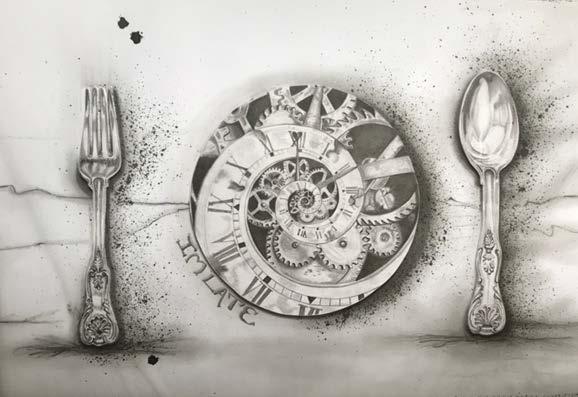

We hope you've been paying attention to the fascinating content of the articles in this year´s magazine because we're about to see just how much you´ve learnt!
2.________ shirts (Mr Cane-Hardy's nemesis)
3.Chats with mini-rolls
5.The teacher still waiting for his letter from Hogwarts
8.The target of every rugby seven player...
9.The Roman name for Bath
10.You'll be out of breath by the time you reach it!
11.Shameless self-plug of our podcast ;)
12.Every student's favourite illicit outing
13.____ Sports Centre
15.______ is the word!
1.Nuclear ______
3.The elite school choir
4.Famous writer who was resident of Bath
6.Ancient trade route, spanning from China into Europe
7.The last leader of the Soviet Union
12._______, curiosity and generosity
14.The new outdoor area to be built next to St Peter's
16.The _________ Bridge



